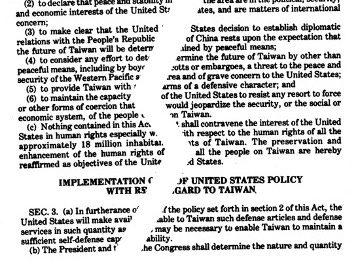S.4428: Gutting the Taiwan Relations Act
Before I spill my bile, I want to call to your attention an excellent article from “War On the Rocks” (https://warontherocks.com/2022/08/getting-the-taiwan-policy-act-right/?__s=tyvai1mnag4xajni46a5) by Rich Armitage and Zack Cooper. They rightly warn that S.4428 – the Taiwan Policy Act of 2022, by putting “…Too much focus on symbolism could also undermine the growing consensus in the United States around supporting Taiwan both militarily and economically.” I would add that passage of S.4428 would cause China to go bat-shit and force its leaders to speed up any plans they may have for taking Taiwan by force. Also, as Rich and Zack rightly emphasize “… it is risky to make major rhetorical changes before the United States and Taiwan are better prepared for a crisis or conflict.”
S.4428 contains many great ideas and proposes a way forward for enhancing our support to Taiwan in a variety of ways and especially by giving it a high priority. Where it fails and would likely make matters worse for Taiwan is summed up in its last section that reads: “SEC. 901. RULE OF CONSTRUCTION,
Nothing in this Act may be construed. –
(1) to restore diplomatic relations with the Republic of China; or
(2) to alter the United States Government’s position with respect to the international status of the Republic of China.”
Unfortunately, neither statement accurately depicts what is in S.4428. Indeed, a careful reading of the bill demonstrates just the opposite. You can say as the bill does that it “… remains faithful to United States principles and values, consistent with the Taiwan Relations Act and the Six Assurances,” but it doesn’t. The TRA was written by the Congress to establish “unofficial” relations with the people in Taiwan. S.4428 turns this notion on its head. Thirteen (13) times the bill refers to the Government of Taiwan. For those who want to check, the TRA contains zero mentions of the Government of Taiwan. Congress established a nonprofit organization, the American Institute in Taiwan (AIT) to maintain our relations and responsibilities to the people in Taiwan.
Yet, if these were the only references that contradict the TRA’s fundamental basis for establishing “unofficial” relations it would be one thing, but several provisions make it clear that S.4428 throws the “unofficial” aspect of the relationship under the bus. Here are just a few examples of what I mean:
(1) “…to welcome Taiwan's meaningful participation in important international organizations, including organizations that address global health, civilian air safety, and efforts to counter transnational crime and bilateral and multilateral security summits, military exercises [emphasis mine], and economic dialogues and forums.”
(2) “… war games; and robust, operationally relevant, or full-scale military exercises.” [emphasis mine]
(3) “… the United States Trade Representative and the Secretary of Commerce should undertake efforts
(4) “… STATEMENT OF POLICY. —It is the policy of the United States to invite Taiwanese counterparts to participate in high-level bilateral and multilateral summits, military exercises,” [emphasis mine]
(5) “… The Secretary of State and other Federal departments and agencies shall...engage with the democratically elected government of Taiwan as the legitimate representative of the people of Taiwan; and …end the outdated practice of referring to the government in Taiwan as the “Taiwan authorities.” [emphasis mine/Bye-bye to “unofficial” relations].
(6) Notwithstanding the continued supporting role of the American Institute in Taiwan[emphasis mine] in carrying out United States foreign policy and protecting United States interests in Taiwan, the United States Government may not place any undue restrictions on the ability of officials of the Department of State and other United States Government agencies from interacting directly and routinely with counterparts in the Taiwan government. [again, emphasis mine]
(7) “… the Secretary of State shall rescind any contact guideline, internal restriction, section of the Foreign Affairs Manual or the Foreign Affairs Handbook, or related guidance or policies that, explicitly or implicitly, including through restrictions or limitations on activities of United States Government personnel, [emphasis mine] limits the ability of members of the armed forces of the Republic of China (Taiwan) and government representatives from the Taipei Economic and Cultural Representative Office to display, for official purposes, symbols of Republic of China sovereignty…”
(8) “… to provide the people of Taiwan with de facto diplomatic treatment equivalent to foreign countries, nations, states, governments, or similar entities;” (emphasis mine)
(9) “…The appointment of an individual to the position of Director of the American Institute in Taiwan’s Taipei office shall be subject to the advice and consent of the Senate. Upon Senate confirmation, such individual shall have the title of Representative
Each of these is a poke in eye of the Chinese and turns the TRA on its head. S.4428 brings an end to “unofficial relations” – the bedrock principle of the original legislation. None of this necessary. It is all symbolic. Find other ways to give China the finger. All the excellent substantive elements of the legislation could be accomplished through the existing American Institute in Taiwan (AIT) and its Taipei counterpart. It would require expanding its size and seconding of officers from all relevant government agencies, but it could be done, and without giving the PRC the signal that the US had established diplomatic relations in all but name.
The Senators should ask what they want most –stick it to the PRC or help Taiwan? If they choose the former, they are likely to get the war they anticipate much sooner and before we and Taiwan have had time to make the necessary preparations. Hopefully, they will come to their senses and make Taiwan a high priority in the right way.



